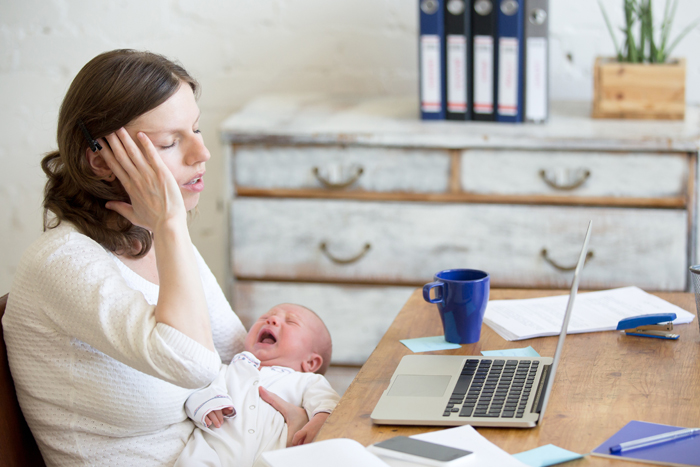What is Postpartum Depression?
Postpartum depression (PPD) is the most common medical complication from childbirth.
This very real form of depression has often been minimalized as the “baby blues.” But there is a difference between postpartum depression and feeling the results of hormonal imbalances that may cause sadness.
What Are the Causes of Postpartum Depression?
It is very difficult to say what causes postpartum depression. Even the Mayo Clinic says that “it is simply a complication of giving birth.”
Having a baby may impact a number of things in some new mothers’ lives, including her body and her ability to get enough sleep (the latter can be a huge contributor to depression). Plus, after birth there is a dramatic drop in hormones – including estrogen, progesterone, and other hormones produced by the thyroid gland. This hormone drop may contribute to PPD by causing feelings of exhaustion, sluggishness, and depression.
While feeling sad, moody, or tired is normal in the first few weeks after childbirth, PPD is different. Common symptoms of post partum depression include “intense irritability and anger, fear that you’re not a good mother, hopelessness. Yet, without proper screening, up to half of PPD cases may go undiagnosed.
Further, a new mother may be reluctant to talk about how they are feeling for fear that they will be judged or be seen as an unfit mother.
Postpartum Depression Impacts More Than Just New Moms

Parents.com points to a lack of sleep as “probably the biggest culprit when it comes to depression among new dads.” Others include a history of depression, financial challenges, and a “sick, colicky, or premature baby.”
“Any parent facing the emotional and social upheavals that a baby ushers in is at risk for depression,” says Sara Rosenquist, Ph.D., a therapist in Chapel Hill, N.C.
She adds that adoptive parents are vulnerable.
Postpartum Psychosis: A More Severe and Potentially Dangerous Illness
There is an even more severe form of PPD known as postpartum psychosis. The Action on Postpartum Psychosis Network writes that there are some women (like those with a history of bipolar disorder) who are at much higher risk.
Postpartum psychosis symptoms are considerably more dramatic than postpartum depression symptoms. The Postpartum Psychosis Network writes that these can include:
- “Strange beliefs that could not be true (delusions)
- Hearing, seeing, feeling, or smelling things that are not there (hallucinations)
- High mood with loss of touch with reality (mania)
- Severe confusion
- Feeling that things are connected in special ways or that stories on the TV or radio have special personal meaning
- Feeling that the baby is connected to God or the Devil in some way”
The illness can get worse very quickly and should always be treated as a medical emergency. Most women are treated with medication and, in some cases, can be admitted to hospital.
Postpartum Depression is Real
The Mayo Clinic urges patients to contact their doctor when symptoms:
- “Don’t fade after two weeks
- Are getting worse
- Make it hard for you to care for your baby
- Make it hard to complete everyday tasks”
If experiencing any of these symptoms, moms and dads should schedule an appointment with a doctor or a mental healthcare provider as soon as possible.
Additionally, if these symptoms turn to thoughts of suicide or harm to the baby, you should call the National Suicide Prevention Lifeline at 1-800-273-TALK (1-800-273-8255) or use its webchat on suicidepreventionlifeline.org/chat.
The Mayo Clinic reminds us that “any new mom can experience postpartum depression and it can develop after the birth of any child, not just the first.” You are at greater risk, however, if you have a history of depression or other mental health issues, and if left untreated, PPD can hinder the critical bonding between mother and baby.
The most important step is to be open about your mental health history during your pregnancy by monitoring and sharing any symptoms of depression before and after childbirth.
If you are pregnant and struggling with depression, talk to your doctor.
Our articles are for informational purposes only and are reviewed by our Medical Information team, which includes PharmDs, MDs, and PhDs. Do not make any changes to your current medications or dosing without consulting your healthcare provider.
The GeneSight test must be ordered by and used only in consultation with a healthcare provider who can prescribe medications. As with all genetic tests, the GeneSight test results have limitations and do not constitute medical advice. The test results are designed to be just one part of a larger, complete patient assessment, which would include proper diagnosis and consideration of your medical history, other medications you may be taking, your family history, and other factors.
If you are a healthcare provider and interested in learning more about the GeneSight test, please contact us at 855.891.9415. If you are a patient, please talk with your doctor to see if the GeneSight test may be helpful.






